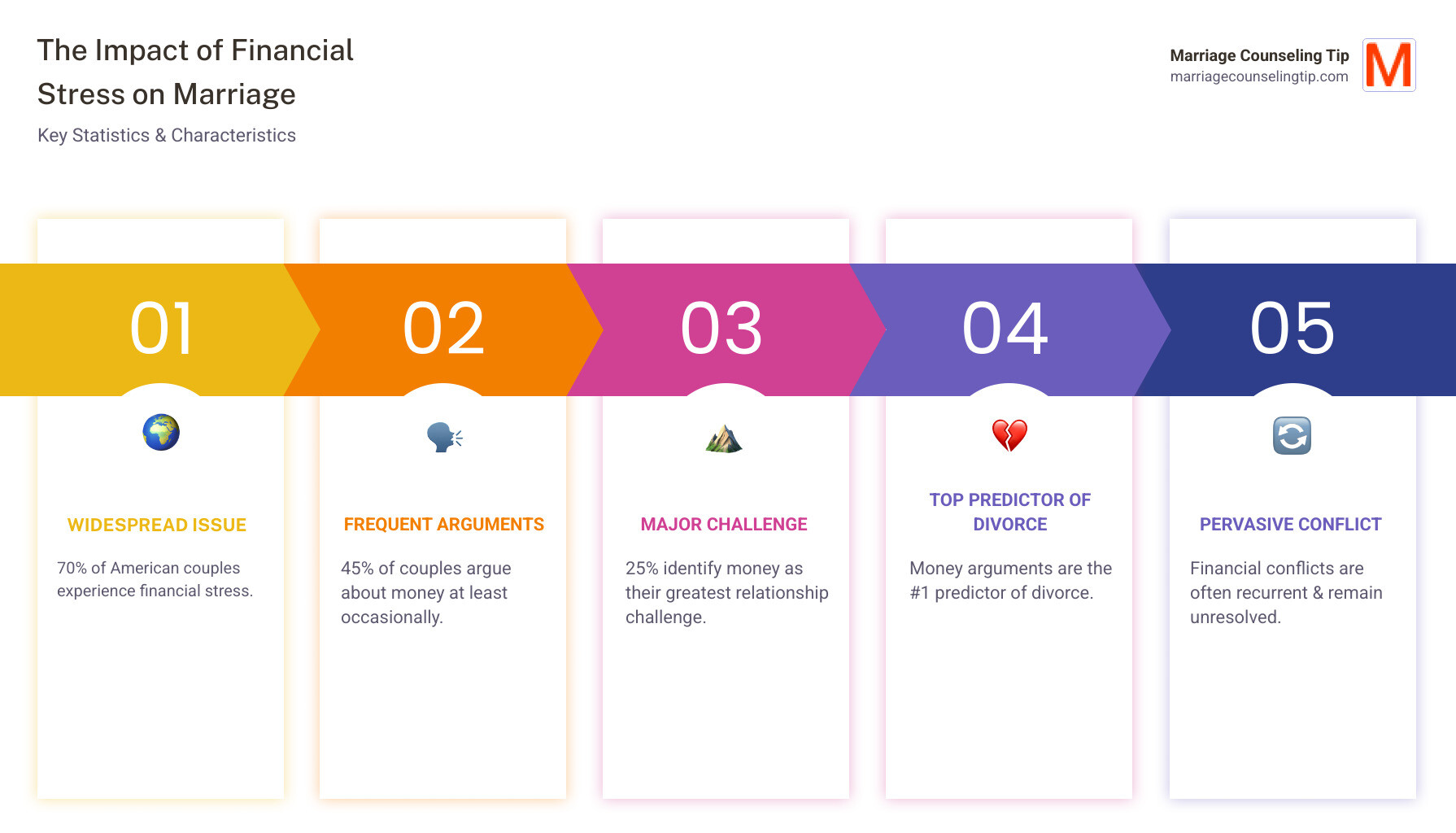
Why Financial Stress is Destroying Modern Marriages
Financial stress marriage challenges affect a staggering 70% of American couples, making money the second most common reason couples fight, right after infidelity. Here’s what you need to know:
Quick Facts About Financial Stress in Marriage:
- 45% of couples argue about money at least occasionally
- 25% identify money as their greatest relationship challenge
- Money arguments are the top predictor of divorce
- Financial conflicts are more pervasive, problematic, and recurrent than other marital disagreements
- These arguments often remain unresolved
The research is clear: arguments about money are by far the top predictor of divorce. But it’s not really about the money itself.
Money represents deeper emotional needs like security, control, and self-worth. When couples fight about finances, they’re often fighting about different things without realizing it. One partner might see money as safety, while the other views it as freedom.
The good news? Financial stress doesn’t have to destroy your marriage.
Couples who learn to communicate calmly about money, set shared goals, and work as a team can come out stronger. The key is shifting from “you vs. me” to “us vs. the problem.”
This guide will walk you through 7 practical steps to transform financial stress from a marriage killer into an opportunity for deeper trust and partnership.

Common financial stress marriage vocab:
Why Money Fights Are So Damaging to a Marriage
Money arguments feel different from other disagreements. When couples fight about whose turn it is to do dishes, it’s manageable. But when money is the battleground, the stakes feel higher and emotions run hotter.
Financial stress marriage conflicts are the top predictor of divorce. Research confirms that money fights can destroy even loving relationships (see the financial factors in divorce for additional context).
Why is money so explosive? Because it symbolizes our security, freedom, power, and values. When one partner sees money as safety and the other as a ticket to fun, their spending habits will clash.

This deeper meaning creates a perfect storm. Communication breaks down as financial stress depletes our mental energy, making productive conversations nearly impossible. Avoiding money talks only builds resentment.
Different money values create friction. If you grew up saving every penny while your partner’s family enjoyed their money, these different “money stories” can make compromise difficult without understanding.
Power struggles can emerge from income differences, with one partner feeling entitled to more financial control, leaving the other feeling dismissed.
Loss of security from job loss or unexpected bills triggers our basic survival fears, making us reactive instead of thoughtful.
External pressures like economic downturns can test whether couples will face challenges together or turn on each other.
The Unique Nature of Financial Conflict in Marriage
What makes money fights so destructive? Research reveals some troubling patterns.
Money arguments are pervasive and recurrent; they pop up constantly, creating an exhausting, never-ending cycle.
These conflicts are also problematic and unresolved. Couples try to solve them, but they often end with “Let’s discuss this later,” and the issues fester.
Most importantly, money carries deeper emotional weight. Arguments about money are often really about trust, respect, and a shared vision for the future, touching our core vulnerabilities.
Both husbands and wives rate money conflicts as highly important to their relationship’s health, which is why these arguments feel so threatening. This creates a vicious cycle where attempts to solve money problems lead to more negativity and anger, eroding overall marital satisfaction.
What is Financial Infidelity and Why is it So Harmful?
Imagine finding your partner has hidden a maxed-out credit card or a secret bank account. This is financial infidelity, and it can be as devastating as sexual betrayal.
Financial infidelity is deceptive financial behavior, such as hidden debt, secret spending on major purchases, or opening secret accounts.
The damage goes beyond the dollar amount. Financial infidelity fundamentally erodes trust, the foundation of a healthy marriage. The deception creates a profound sense of betrayal and disrespect for the partnership.
The betrayed partner often feels manipulated, wondering what else is hidden. The emotional pain can be overwhelming, triggering anger, hurt, and questions about the relationship’s future.
Rebuilding trust after financial deception requires serious commitment. The deceptive partner must commit to radical transparency, sharing all financial information. Both partners need to explore the “why” behind the behavior, whether it stemmed from fear, shame, or control issues.
Professional help is often essential for navigating the emotional fallout and establishing new, transparent financial habits. It’s a long road, but couples can recover with a mutual commitment to healing.
Your 7-Step Plan to Overcome Financial Stress Marriage Woes
Financial stress marriage challenges don’t have to tear you apart. They can become the foundation for building something stronger. Think of this as your roadmap from financial chaos to partnership harmony.
Step 1: Schedule Regular, Calm “Money Dates”
The more stressed couples get about money, the less they talk about it, which only makes the problem worse. It’s time to flip this pattern.
Create a money ritual. Pick a regular time—perhaps Sunday mornings over coffee—and make it sacred. This is about connection, not lectures.
To make these conversations work, start with ground rules. No blame, no interrupting, and no using past purchases as ammunition. Use “I” statements like “I feel worried about our savings” instead of “You never save anything.”
Active listening is your superpower. Hear the feelings underneath the words. Ask, “Help me understand why this is important to you,” instead of jumping to solutions.
Set a simple agenda with 1-3 topics to avoid feeling overwhelmed. Most importantly, remember this is “us versus the problem,” not you versus each other. Approaching communication in marriage this way shifts conflict to collaboration.

Step 2: Uncover Your Individual Money Stories
Everyone brings invisible baggage to money conversations: the deep-rooted beliefs about money programmed into us during childhood.
Maybe your parents fought about every dollar, so you feel anxious about money. Or perhaps your family never discussed it, leaving you feeling lost.
Your money mindset shapes everything. One partner might be a natural saver who values security, while the other is a spender who believes money is for enjoyment. Neither is wrong, but the differences can create friction without understanding.
Take time to explore your family background together. How did your parents handle money? These early experiences create patterns that follow us into adulthood.
Share your financial fears. Maybe you’re terrified of debt or not being able to provide for your family. Understanding your partner’s fears helps their behavior make sense. This isn’t about changing personalities—it’s about understanding and working with your differences.
Step 3: Create a Joint Budget That Works for Both of You
The word “budget” can be intimidating. Think of it as your freedom plan—a roadmap to help you spend money on what you truly value.
Start by tracking your spending for a month using an app or notebook. Most couples are shocked by what they find.
Set shared goals that excite both of you, like paying off debt or saving for a trip. This makes budgeting feel like progress, not punishment.
There are many budgeting methods, like the 50-30-20 rule (50% needs, 30% wants, 20% savings/debt). The best budget is the one you’ll actually use.
Many couples use “yours, mine, and ours” accounts: a joint account for shared expenses and individual accounts for personal spending. This promotes transparency while giving each person autonomy.
Stay flexible and review your plan during money dates. Life changes, and your budget should too. The key is finding balance—being responsible while still enjoying life.
Step 4: Develop a Unified Strategy to Tackle Debt
Debt can feel like a heavy weight, but you can tackle it together. Couples who do often come out stronger.
First, get everything in the open. List every debt with its balance, interest rate, and minimum payment. Transparency is essential.
Choose your attack strategy together. The debt snowball method (paying off the smallest debt first) builds motivation. The debt avalanche method (targeting the highest interest rate first) saves more money. Pick the one that motivates you both.
Debt consolidation can sometimes help by combining multiple debts into one lower-rate loan, simplifying payments.
Work as a team. Celebrate every paid-off debt. Support each other when motivation is low. Avoid the blame game. It doesn’t matter who created the debt; what matters is solving it together.
Step 5: Build Your Financial Safety Net Together
Life throws curveballs like job loss or medical emergencies. These surprises can make financial stress marriage issues overwhelming.
Your emergency fund is like insurance for your relationship. Aim to save 3-6 months of essential expenses in a separate, easily accessible account. Start small—even $25 a week adds up.
Make saving automatic by setting up transfers with each paycheck. Treat it like any other bill. You’ll be amazed how quickly it grows.
This isn’t just about money; it’s about peace of mind. Knowing you can handle unexpected costs without panic allows you to approach challenges calmly. An emergency fund protects your relationship from the extra stress of financial shocks.
Step 6: Reframe Fights as a Team Challenge
Here’s a game-changing shift: Stop seeing financial disagreements as battles to win and start seeing them as puzzles to solve together.
When a financial issue arises, frame it as “us versus the problem.” An unexpected expense isn’t anyone’s fault—it’s a challenge to tackle together.
Focus on brainstorming solutions rather than assigning blame. Get creative. Maybe one of you picks up extra work, or you find ways to cut expenses temporarily.
Celebrate every small win. Paid off a credit card? Do a happy dance. These celebrations build momentum and make the journey more enjoyable.
This mindset shift is crucial for developing empathy skills and maintaining a happy married life during tough times.
Step 7: Seek Support When Needed
Sometimes you need backup, and that’s okay. Recognizing when to get help is a sign of strength.
Consider professional support if you’re stuck in the same arguments, if there’s been financial deception, or if stress is harming your relationship.
Financial advisors can help with the practical side—budgets, debt strategies, and long-term planning.
Marriage counselors focus on the relationship dynamics. They can help you understand the emotional issues tied to money, improve communication, and develop healthier ways to resolve conflict.
You don’t have to figure this out alone. At Marriage Counseling Tip, we specialize in helping couples steer complex challenges, including financial stress. Our therapists provide a safe space to explore your money stories, improve communication, and build a stronger financial future together.

Frequently Asked Questions about Finances and Marriage
How does financial stress marriage impact communication?
Financial stress often leads couples to stop talking about money. This avoidance creates a vicious cycle where problems grow in silence, leading to explosive arguments later. Stress depletes the mental energy needed for patient communication, making partners more reactive and prone to blame.
Instead of teamwork, couples may think, “If only you spent less,” which erodes affection. Research confirms that financial strain predicts negative communication, even in otherwise happy relationships.
However, learning to talk calmly and constructively about money can protect your marriage from this stress and help you weather financial storms together.
What are the biggest triggers for financial stress marriage arguments?
After working with countless couples, we’ve noticed certain financial stress marriage triggers come up again and again:
Different spending personalities: When a saver marries a spender, their conflicting approaches to money can cause daily friction without mutual understanding.
Debt: Whether it’s student loans, credit card debt, or a large mortgage, debt creates ongoing stress and arguments about blame and repayment strategies.
Big purchases: Decisions about a new car or home renovation can force couples to confront different values and priorities without a clear decision-making process.
Mismatched financial goals: If one partner dreams of early retirement while the other wants to travel, every financial decision can become a source of conflict.
Living without a safety net: With no emergency fund, an unexpected bill can trigger panic and blame, affecting every money conversation.
Income differences: A higher-earning partner might feel entitled to make unilateral decisions, leaving the other to feel powerless and resentful.
Financial secrets: Hidden debts or secret spending destroy trust and create a sense of betrayal that is often worse than the financial mistake itself.
These triggers are usually about deeper needs for security, respect, and partnership.
Can a marriage really survive major financial problems?
Absolutely yes. While tough, financial problems don’t have to be relationship killers. Many couples emerge from financial crises stronger than before.
The key is teamwork—facing the issue as “us against the problem.” Healthy communication, focused on solutions instead of blame, is crucial.
Shared goals, like getting out of debt or saving for a house, provide direction and motivation. Overcoming adversity together can reveal hidden strengths, build resilience, and deepen trust and respect.
Financial problems test a marriage, but with the right approach, they can ultimately make it stronger and build a more resilient foundation for a happy married life.
Conclusion
Feeling overwhelmed by financial stress marriage challenges is common, but there is real hope. Money fights are rarely about money; they’re about deeper needs for security and respect.
The 7 steps we’ve outlined are practical tools to transform your relationship with finances. By scheduling money dates, understanding your money stories, budgeting as a team, tackling debt together, building a safety net, reframing fights, and seeking support, you can build a stronger partnership.
Financial harmony is achievable. Overcoming money challenges side-by-side creates a deeper bond and strengthens every aspect of your marriage. These skills—trust, kind communication, and celebrating wins—are invaluable.
If you feel stuck, seeking help is a sign of strength. Financial stress can create deep wounds, and professional guidance can be essential for healing.
Our counselors at Marriage Counseling Tip are ready to guide you through this process with compassion and expertise. We understand that behind every money argument is a couple who wants their relationship to thrive.
Your marriage is worth fighting for—together, as a team, with hope for a brighter financial future.




